This event is hosted by the Organization for Asian Studies, and co-sponsored by the Sigur Center for Asian Studies.
Sigur Center for Asian Studies
At the Elliott School of International Affairs
This event is hosted by the Organization for Asian Studies, and co-sponsored by the Sigur Center for Asian Studies.
Tuesday, April 17, 2018
12:30 PM – 1:45 PM
The Elliott School of International Affairs
1957 E Street, NW, Room 505
Washington, DC 20052
China’s leaders have called for the country to help lead Asia’s economic integration and reshape its approach to security. China’s vision in some ways contrasts with the preferences of the United States and its allies. How does China intend to realize its vision and what does this mean for the United States and the region?
This event is on the record and open to the media.
About the speaker:
 Timothy R. Heath is a senior international defense researcher at the RAND Corporation. Prior to joining RAND in October 2014, he served as the senior analyst for the USPACOM China Strategic Focus Group for five years. He worked for more than 16 years on the strategic, operational, and tactical levels in the U.S. military and government, specializing on China, Asia, and security topics.
Timothy R. Heath is a senior international defense researcher at the RAND Corporation. Prior to joining RAND in October 2014, he served as the senior analyst for the USPACOM China Strategic Focus Group for five years. He worked for more than 16 years on the strategic, operational, and tactical levels in the U.S. military and government, specializing on China, Asia, and security topics.
Heath has published numerous articles and one book. Fluent in Mandarin Chinese, he has extensive experience analyzing China’s national strategy, politics, ideology, and military, as well as of Asian regional security developments. He earned an M.A. in Asian studies from George Washington University and a B.A. in philosophy from the College of William and Mary. He is currently pursuing a Ph.D. in Political Science from George Mason University.
This event is hosted by the Organization of Asian Studies, co-sponsored by the Sigur Center for Asian Studies.
Thursday, April 5, 2018
3:00 PM – 7:00 PM
The Elliott School of International Affairs
1957 E Street, NW, State Room (7th Floor)
Washington, DC 20052
Experts will assess the strengths and weaknesses of Taiwan’s defense capacity vis-a-vis China, and how the political and security relationship with the United States factors into Taiwan’s security calculus.
This event is on the record and open to the media.
Agenda:
3:00 PM – 3:30 PM:
Registration and Welcoming Remarks
3:30 PM – 5:00 PM:
PANEL I: The US-Taiwan Security Relationship and the US Factor in Taiwan’s Defense
5:00 PM – 5:30 PM:
Break for High Tea and Refreshments
5:30 PM – 7:00 PM:
PANEL II: Taiwan’s Strategic and Defense Capacities: Strengths and Weaknesses
About the Speakers:
 Bonnie Glaser is a senior adviser for Asia and the director of the China Power Project at CSIS, where she works on issues related to Asia-Pacific security with a focus on Chinese foreign and security policy. Ms. Glaser has worked for more than three decades at the intersection of Asia-Pacific geopolitics and U.S. policy. Prior to joining CSIS, she served as a consultant for various U.S. government offices, including the Departments of Defense and State. Ms. Glaser received her B.A. in political science from Boston University and her M.A. with concentrations in international economics and Chinese studies from the Johns Hopkins School of Advanced International Studies.
Bonnie Glaser is a senior adviser for Asia and the director of the China Power Project at CSIS, where she works on issues related to Asia-Pacific security with a focus on Chinese foreign and security policy. Ms. Glaser has worked for more than three decades at the intersection of Asia-Pacific geopolitics and U.S. policy. Prior to joining CSIS, she served as a consultant for various U.S. government offices, including the Departments of Defense and State. Ms. Glaser received her B.A. in political science from Boston University and her M.A. with concentrations in international economics and Chinese studies from the Johns Hopkins School of Advanced International Studies.
 Lt. Gen. Wallace “Chip” Gregson, Jr. (ret.) most recently served as the Assistant Secretary of Defense, Asian and Pacific Security Affairs. Previously, he served as Chief Operating Officer for the United States Olympic Committee, then as an independent consultant before entering Government in 2009. LtGen. Gregson is a member of the Council on Foreign Relations; the U.S. Naval Institute; and the Marine Corps Association. He is a Trustee of the Marine Corps University Foundation. His civilian education includes a Bachelor’s degree from the U.S. Naval Academy, and Master’s degrees in Strategic Planning from the Naval War College, and International Relations from Salve Regina College.
Lt. Gen. Wallace “Chip” Gregson, Jr. (ret.) most recently served as the Assistant Secretary of Defense, Asian and Pacific Security Affairs. Previously, he served as Chief Operating Officer for the United States Olympic Committee, then as an independent consultant before entering Government in 2009. LtGen. Gregson is a member of the Council on Foreign Relations; the U.S. Naval Institute; and the Marine Corps Association. He is a Trustee of the Marine Corps University Foundation. His civilian education includes a Bachelor’s degree from the U.S. Naval Academy, and Master’s degrees in Strategic Planning from the Naval War College, and International Relations from Salve Regina College.
 Richard Fisher is a Senior Fellow with the International Assessment and Strategy Center. He has previously worked with the Center for Security Policy, Jamestown Foundation China Brief, U.S. House of Representatives Republican Policy Committee, and The Heritage Foundation. He is the author of China’s Military Modernization, Building forRegional and Global Reach (Praeger, 2008, Stanford University Press, 2010, Taiwan Ministry ofNational Defense translation, 2012). His articles have been published in Far Eastern Economic Review, Asian Wall Street Journal, The Washington Times, The Sankei Shimbun, World Airpower Review and Air Forces Monthly. He received a B.A. (Honors) in 1981 from Eisenhower College.
Richard Fisher is a Senior Fellow with the International Assessment and Strategy Center. He has previously worked with the Center for Security Policy, Jamestown Foundation China Brief, U.S. House of Representatives Republican Policy Committee, and The Heritage Foundation. He is the author of China’s Military Modernization, Building forRegional and Global Reach (Praeger, 2008, Stanford University Press, 2010, Taiwan Ministry ofNational Defense translation, 2012). His articles have been published in Far Eastern Economic Review, Asian Wall Street Journal, The Washington Times, The Sankei Shimbun, World Airpower Review and Air Forces Monthly. He received a B.A. (Honors) in 1981 from Eisenhower College.
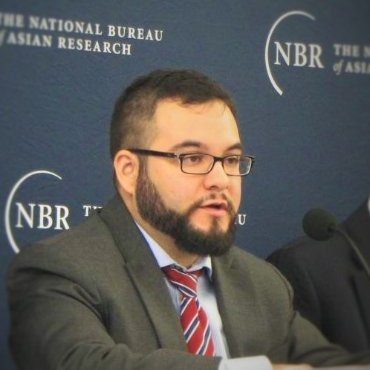 David Gitter is the Director of the Party Watch Initiative, a Project 2049 Institute program that tracks the latest activities of the Chinese Communist Party (CCP) and specializes in analysis of authoritative open source Chinese language materials. Prior to joining the Institute, he has worked in various analytical capacities at the Congressional Research Service (CRS), the Office of the Under Secretary of Defense for Policy (OUSDP), Project 2049 Institute, and the Center for Strategic and International Studies (CSIS) focusing on Chinese foreign policy and broader Asian security issues. Gitter received his MA in Asian Studies from the Elliott School of International Affairs at George Washington University.
David Gitter is the Director of the Party Watch Initiative, a Project 2049 Institute program that tracks the latest activities of the Chinese Communist Party (CCP) and specializes in analysis of authoritative open source Chinese language materials. Prior to joining the Institute, he has worked in various analytical capacities at the Congressional Research Service (CRS), the Office of the Under Secretary of Defense for Policy (OUSDP), Project 2049 Institute, and the Center for Strategic and International Studies (CSIS) focusing on Chinese foreign policy and broader Asian security issues. Gitter received his MA in Asian Studies from the Elliott School of International Affairs at George Washington University.
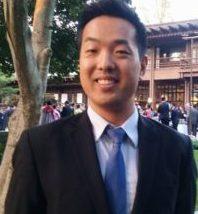 David An is currently the Senior Research Fellow at Global Taiwan Institute. Prior to joining GTI, David was a political-military affairs officer covering the East Asia region at the U.S. State Department from 2009 to 2014, and initiated the first Taiwan interagency political-military visit to the U.S., which have continued to occur annually. Prior to joining the State Department, he was a Fulbright scholar researching democracy in Taiwan and village elections in China. He received his M.A. from UCSD Graduate School of Global Policy and Strategy and his B.A. from UC Berkeley. He publishes and speaks widely on East Asian political and security matters.
David An is currently the Senior Research Fellow at Global Taiwan Institute. Prior to joining GTI, David was a political-military affairs officer covering the East Asia region at the U.S. State Department from 2009 to 2014, and initiated the first Taiwan interagency political-military visit to the U.S., which have continued to occur annually. Prior to joining the State Department, he was a Fulbright scholar researching democracy in Taiwan and village elections in China. He received his M.A. from UCSD Graduate School of Global Policy and Strategy and his B.A. from UC Berkeley. He publishes and speaks widely on East Asian political and security matters.
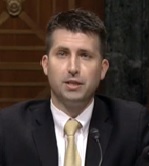 Ian Easton is a research fellow at the Project 2049 Institute, where he conducts research on defense and security issues in Asia. Previously, Ian worked as a China analyst at the Center for Naval Analyses (CNA) for two years. Prior to that, he lived in Taipei from 2005 to 2010. During his time in Taiwan, he worked as a translator for Island Technologies Inc. and the Foundation for Asia-Pacific Peace Studies. While in Taiwan, he also conducted research with the Asia Bureau Chief of Defense News. Ian holds an M.A. in China Studies from National Chengchi University in Taiwan and a B.A. in International Studies from the University of Illinois Urbana-Champaign.
Ian Easton is a research fellow at the Project 2049 Institute, where he conducts research on defense and security issues in Asia. Previously, Ian worked as a China analyst at the Center for Naval Analyses (CNA) for two years. Prior to that, he lived in Taipei from 2005 to 2010. During his time in Taiwan, he worked as a translator for Island Technologies Inc. and the Foundation for Asia-Pacific Peace Studies. While in Taiwan, he also conducted research with the Asia Bureau Chief of Defense News. Ian holds an M.A. in China Studies from National Chengchi University in Taiwan and a B.A. in International Studies from the University of Illinois Urbana-Champaign.
Audio Recording Part 1
Audio Recording Part 2
Audio Recording Part 3
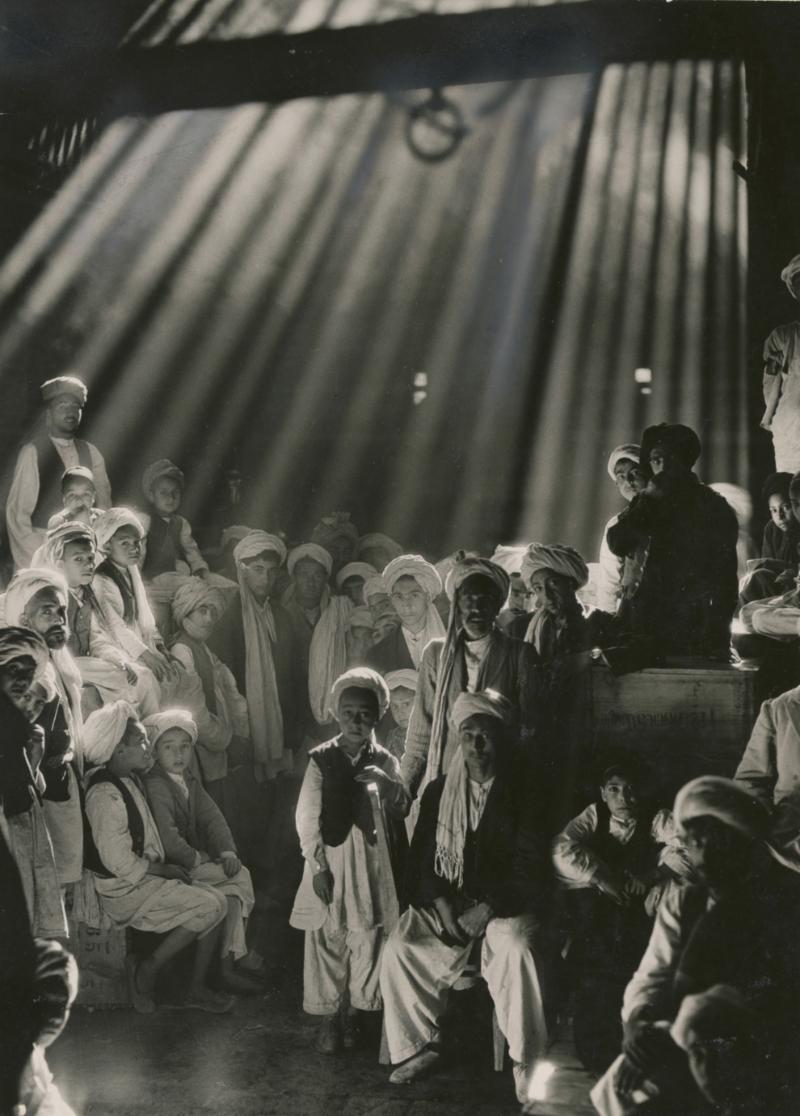
Part of the Sigur Center’s Visiting Scholar Roundtable Series
Wednesday, March 28, 2018
12:00 PM – 1:30 PM
Chung-wen Shih Conference Room
The Elliott School of International Affairs
1957 E Street, NW, Suite 503
Washington, DC 20052
Early photography of the Silk Road is a sub-genre of early photography. These photographs have contributed significantly to the Western world’s vision of the Silk Road and Asia but they have yet to be studied in depth. This talk explains what early Silk Road photography looks like, its origins, who produced it and why.
This event is on the record and open to the media.
About the speaker:
 Maeve Nolan is a second year PhD Art History and Archeology student at the School of Oriental and African Studies, University of London. She is currently a visiting scholar with George Washington University’s Sigur Center whilst she conducts her research at the National Geographic Society. The title of her PhD is:
Maeve Nolan is a second year PhD Art History and Archeology student at the School of Oriental and African Studies, University of London. She is currently a visiting scholar with George Washington University’s Sigur Center whilst she conducts her research at the National Geographic Society. The title of her PhD is:
“Early Silk Road photography: A case study of how and why Dr. Maynard Owen Williams, Litt. D. (1888-1963) photographed the Silk Road during the Citroen-Haardt Trans-Asiatic Expedition (1931-1932)”
Her PhD examines early photography of the Silk Road through a close analysis of the work of one of the last of the early Silk Road photographers, Maynard Owen Williams (1888-1963). She has chosen Williams’ photographs of the Citroen-Haardt Trans-Asiatic Expedition (1931-1932), which re-traced the route of Marco Polo, as a case study. These photographs present some of the most technically proficient, romantic, painterly and widely distributed examples of early Silk Road photography and appeared alongside articles Williams wrote for the influential American publication, the National Geographic Magazine.
Through her research, she intends to shed light on this overlooked photographic genre and help to deepen understanding of its impact on the Western world’s relationship with and understanding of Asia and the Silk Road.
2:00pm – 2:30pm – Registration
2:30pm – 4:00pm – Lecture and Q&A
4:00pm – 4:30pm – Refreshments & networking
Room: Lindner Commons (Rm 602)
Address: Elliott School of International Affairs – 1957 E St NW, Washington, DC
Audio Recording Part 1
Audio Recording Part 2
Audio Recording Part 3
Tuesday, March 27, 2018
2:00 PM – 4:00 PM
The George Washington University
Elliott School of International Affairs
1957 E Street NW
Lindner Family Commons, Room 602
Washington, DC 20052
Gallery 102 is proud to present “As The World Watches.” This exhibition presents a select collection of responses to the humanitarian crisis affecting communities in Myanmar (formerly Burma). Like many other countries in our modern era, Myanmar is experiencing an increasingly fractured society and a growing radical movement within their politics. In keeping with some of history’s worst examples of conflict, the rapidly escalating violence in Myanmar is centered around religious and ethnic divisions. Recent riots have caused massive upheaval in the country, bringing long past due attention to the host of human rights issues affecting the Rohingya people. In the wake of this flood, the world has begun to turn its focus on the true cost and scope of a modern genocide. The aim of As The World Watches is to raise awareness of Myanmar’s long history of displaced peoples, and examine how the concept of “Other” has led to the systematic and ongoing annihilation of entire communities. Change can only begin with knowledge.
As part of this series, Gallery 102 and the Sigur Center for Asian Studies will present a film screening of “Left for Dead: Myanmar’s Muslim Minority.” The film shows what VICE News uncovered about its investigation into the violence and discrimination faced by the country’s Muslim minority. Following the screening will be a panel discussion on the film and the broader social, political, and historical context of the situation.
Discussants:
Layla Saad, Gallery 102 Curator & Co-Chair
Dr. Christina Fink, Professor of Practice of International Affairs, GW
Matthew Wells, Senior Crisis Advisor, Amnesty International
Robert Marro, Burma Task Force
About the film:
In recent years, democratic reforms have swept through Myanmar, a country that for decades was ruled by a military junta. As the reforms took hold, however, things were growing progressively worse for the Rohingya, a heavily persecuted ethnic Muslim minority concentrated in the country’s western state of Rakhine.
The 2012 gang rape and murder of a Buddhist woman by three Muslim men ignited violent riots in which hundreds were killed as Rakhine Buddhists and Rohingya attacked each other. In the following months, tens of thousands of Rohingya were rounded up and forced to live in squalid camps; Human Rights Watch deemed the attacks crimes against humanity that amounted to ethnic cleansing of the Rohingya. Thousands of Rohingya have since attempted to leave the country, fueling the region’s intricate and brutal human trafficking network.
Audio Recording Part 1
Audio Recording Part 2
Wednesday, April 11, 2018
12:00 PM – 2:00 PM
The Elliott School of International Affairs
1957 E Street, NW, Lindner Family Commons, Room 602
Washington, DC 20052
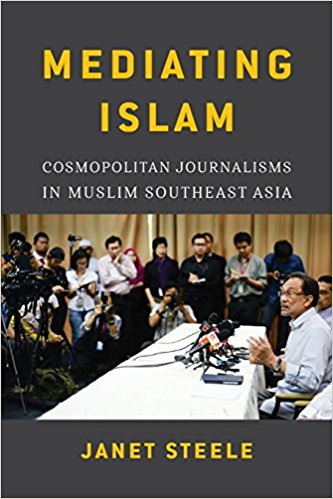
Broadening an overly narrow definition of Islamic journalism, Janet Steele examines day-to-day reporting practices of Muslim professionals, from conservative scripturalists to pluralist cosmopolitans, at five exemplary news organizations in Malaysia and Indonesia. At Sabili, established as an underground publication, journalists are ed for their ability at dakwah, or Islamic propagation. At Tempo, a news magazine banned during the Soeharto regime and considered progressive, many see their work as a manifestation of worship, but the publication itself is not considered Islamic. At Harakah, reporters support an Islamic political party, while at Republika they practice a “journalism of the Prophet” and see Islam as a market niche. Other news organizations, too, such as Malaysiakini, employ Muslim journalists. Steele, a longtime scholar of the region, explores how these publications observe universal principles of journalism through an Islamic idiom.
This event is on the record and open to the media.
About the speaker:
 Dr. Janet Steele is an associate professor of journalism at the George Washington University and the director of the Institute for Public Diplomacy and Global Communication. She received her Ph.D. in History from the Johns Hopkins University and focus on how culture is communicated through the mass media.
Dr. Janet Steele is an associate professor of journalism at the George Washington University and the director of the Institute for Public Diplomacy and Global Communication. She received her Ph.D. in History from the Johns Hopkins University and focus on how culture is communicated through the mass media.
Dr. Steele is a frequent visitor to Southeast Asia where she lectures on topics ranging from the role of the press in a democratic society to specialized courses on narrative journalism. Her book, “Wars Within: The Story of Tempo, an Independent Magazine in Soeharto’s Indonesia,” focuses on “Tempo” magazine and its relationship to the politics and culture of New Order Indonesia. Awarded two Fulbright teaching and research grants, she has served as a State Department speaker-specialist in Indonesia, Malaysia, Vietnam, Cambodia, Brunei, the Philippines, East Timor, Taiwan, Burma, Sudan, Egypt, India and Bangladesh. The author of numerous articles on journalism theory and practice, her most recent book, “Email Dari Amerika,” (Email from America), is a collection of newspaper columns written in Indonesian and originally published in the newspaper Surya. Her most recent book is Mediating Islam, Cosmopolitan Journalisms in Muslim Southeast Asia.
Co-sponsored by the Sigur Center for Asian Studies and the Elliott School of International Affairs
Audio Recording Part 1
Audio Recording Part 2
Audio Recording Part 3
Monday, March 26, 2018
12:45 PM – 2:00 PM
Gelman Library, Room 702
2130 H St. NW
Washington, DC 20052
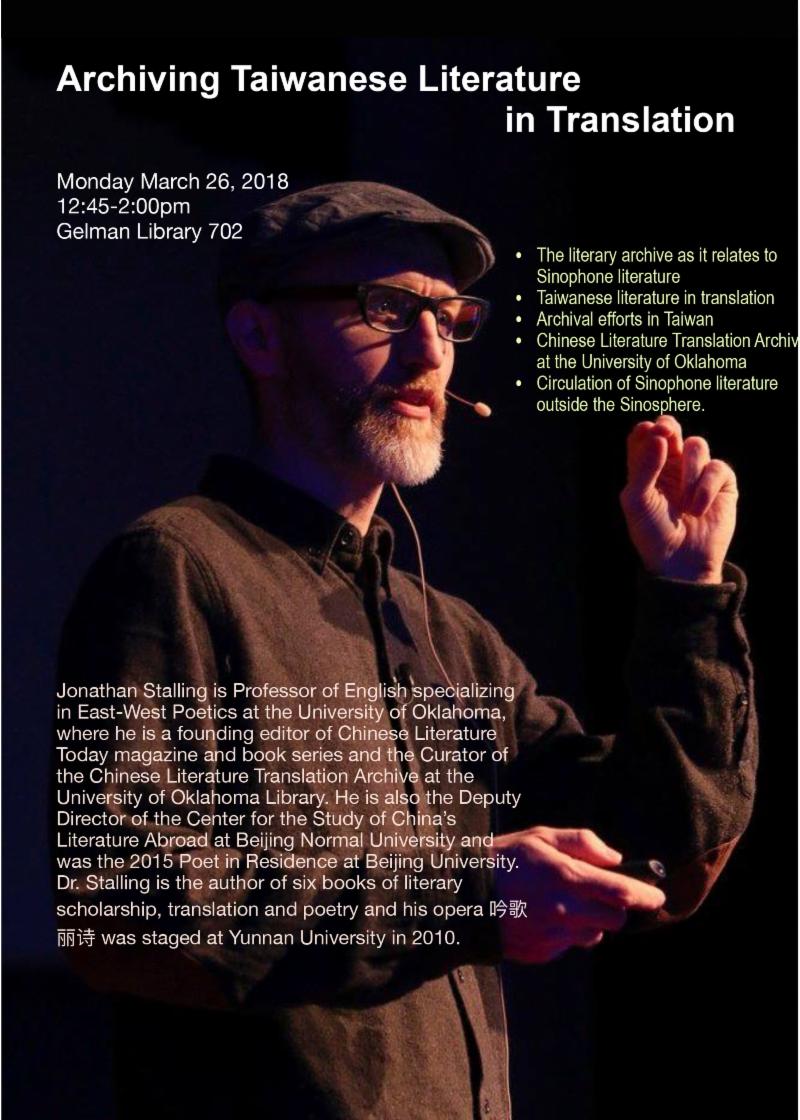
You are invited to join us for a discussion with Dr. Jonathan Stalling on the topic of “Archiving Taiwanese Literature in Translation.” Dr. Stalling will cover topics including:
* The literary archive as it relates to Sinophone literature
* Taiwanese literature in translation
* Archival efforts in Taiwan
* Chinese Literature Translation Archive at the University of Oklahoma
* Circulation of Sinophone literature outside the Sinosphere
And much more! Please come and join the discussion. This event is on the record and open to the media.
About the speaker:
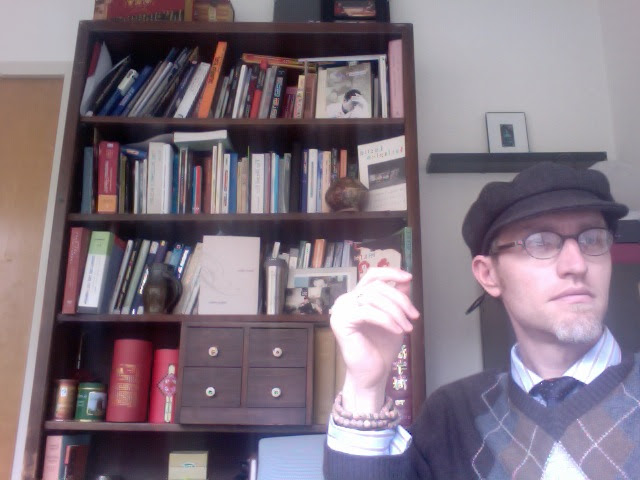 Dr. Jonathan Stalling is Professor of English specializing in East-West Poetics at the University of Oklahoma, where he is a founding editor of Chinese Literature Today magazine and book series and the Curator of the Chinese Literature Translation Archive at the University of Oklahoma Library. He is also the Deputy Director of the Center for the Study of China’s Literature Abroad at Beijing Normal University and was the 2015 Poet in Residence at Beijing University. Dr. Stalling is the author of six books of literary scholarship, translation and poetry and his opera 吟歌 丽诗 was staged at Yunnan University in 2010.
Dr. Jonathan Stalling is Professor of English specializing in East-West Poetics at the University of Oklahoma, where he is a founding editor of Chinese Literature Today magazine and book series and the Curator of the Chinese Literature Translation Archive at the University of Oklahoma Library. He is also the Deputy Director of the Center for the Study of China’s Literature Abroad at Beijing Normal University and was the 2015 Poet in Residence at Beijing University. Dr. Stalling is the author of six books of literary scholarship, translation and poetry and his opera 吟歌 丽诗 was staged at Yunnan University in 2010.
This event is co-sponsored by GW’s Department of East Asian Languages and Literatures, the Sigur Center for Asian Studies, and the Taiwan Academy.